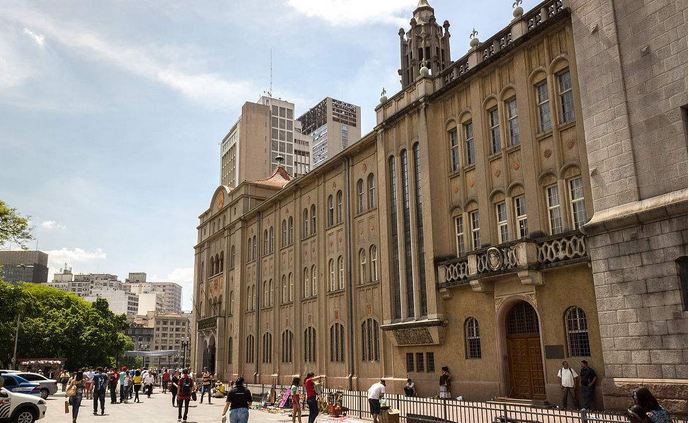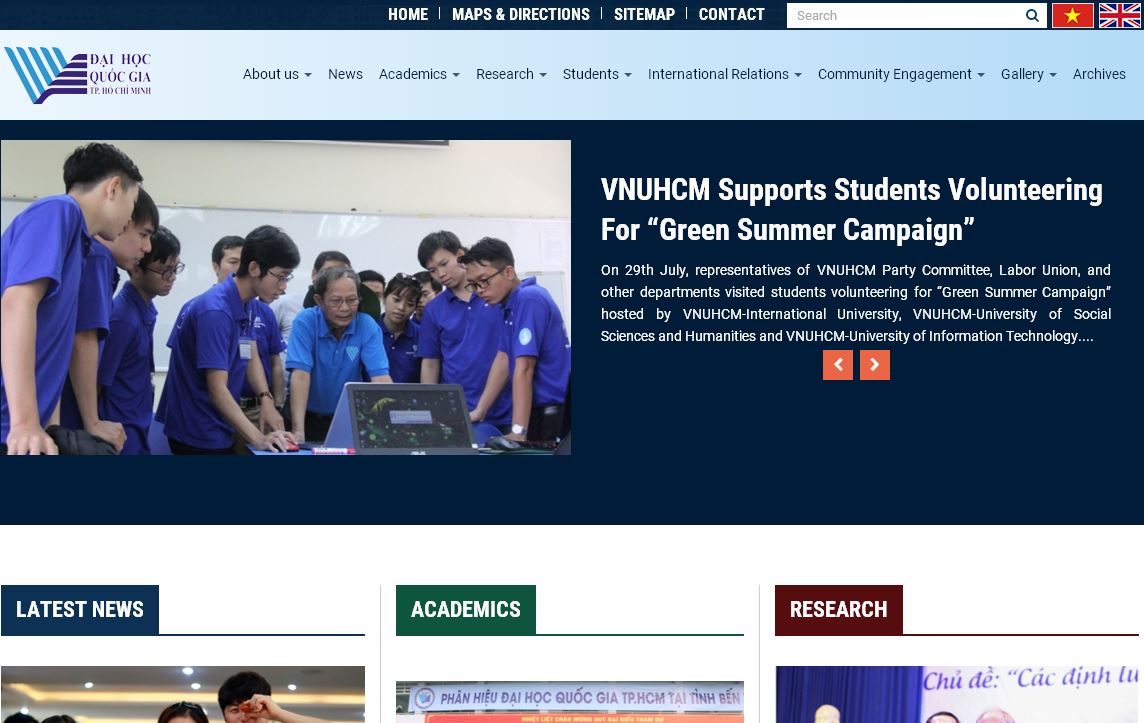选择热点
 荷兰莱顿大学
荷兰莱顿大学 西班牙巴塞罗那大学
西班牙巴塞罗那大学 巴西圣保罗大学 University of Sao Paulo, Brazil
巴西圣保罗大学 University of Sao Paulo, Brazil 台湾南华大学 University of South China in Taiwan
台湾南华大学 University of South China in Taiwan 科技大学 National University of Defense Technology
科技大学 National University of Defense Technology 南京大学 Nanjing University
南京大学 Nanjing University 上海复旦大学 Fudan University
上海复旦大学 Fudan University 泗水大学(Ubaya)
泗水大学(Ubaya) 印尼大学 universitas indonesia
印尼大学 universitas indonesia 越南某大学 Vietnam National University
越南某大学 Vietnam National University 菲律宾大学 University Of The Philippines
菲律宾大学 University Of The Philippines
Girls of Summer 夏日女孩
发布时间:2025-01-06
来源:大学网站
Girls of Summer 夏日女孩◎ Kristie HelmsWe lived on the banks of the Tennessee River, and we owned the summers when we were girls.
We ran wild through humid summer days that never ended but only melted one into the other.
We floated down rivers of weekdays with no school, no rules, no parents, and no constructs other than our fantasies.
We were good girls, my sister and I.
We had nothing to rebel against.
This was just life as we knew it, and we knew the summers to be long and to be ours.
The road that ran past our house was a one lane rural route.
Every morning, after our parents had gone to work, I’d wait for the mail lady to pull up to our box.
Some days I would put enough change for a few stamps into a mason jar lid and l eave it in the mailbox.
I hated bothering mail lady with this transaction, which made her job take longer.
But I liked that she knew that someone in our house sent letters into the outside world.
I liked walking to the mailbox in my bare feet and leaving footprints on the dewy grass.
I imagined that feeling the wetness on the bottom of my feet made me a poet.
I had never read poetry, outside of some Emily Dickinson.
But I imagined that at people who knew of such things would walk to their mailboxes through the morning dew in their bare feet.
We planned our weddings with the help of barbie dolls and the tiny purple wild flowers growing in our side yard.
We became scientists and tested concoctions of milk, orange juice, and mouthwash.
We ate handfuls of bittersweet chocolate chips and licked peanut butter off spoons.
When we ran out of sweets to eat, we snitched sugary Flintstones vitamins out of the medicine cabinet.
We became masters of the Kraft macaroni and cheese lunch, and we dutifully called our mother at work three times a day to give her updates on our adventures.
But don’t call too often or speak too loudly or whine too much, we told ourselves, or else they’ll get annoyed and she’ll get fired and the summers will end.
We shaped our days the way we chose, far from the prying eyes of adults.
We found our dad’s Playboys and charged the neighborhood boys money to look at them.
We made crank calls around the county, telling people they had won a new car.
What kind?
” they’d ask.
Red.
” we’d always say.
We put on our mom’s old prom dresses, complete with gloves and hats, and sang backup to the C.
W.
McCall song convoy, which we’d found on our dad’s turntable.
We went on hikes into the woods behind our house, crawling under barbed wire fences and through tangled undergrowth.
Heat and humidity found their way through he leaves to our flushed faces.
We waded in streams that we were always surprised to come across.
We walked past cars and auto parts that had been abandoned in the woods, far from any road.
We’d reach the tree line and come out unexpectedly into a cow pasture.
We’d perch on the gate or stretch out on the large flat limes tone outcrop that marked the end of the Woods Behind Our House.
One day a thunderstorm blew up along the Tennessee River.
It was one of those storms that make the day go dark and the humidity disappear.
First it was still and quiet.
There was electricity in the air and then the sharp crispness of a summer day being blown wide open as the winds rushed in.
We threw open all the doors and windows.
We found the classical radio station from two towns away and turned up the bass and cranked up the speakers.
We let the wind blow in and churn our summer day around.
We let the music we were only vaguely familiar with roar through the house.
And we twirled.
We twirled in the living room in the wind and in the music.
We twirled and we imagined that we were poets and dancers and scientists and spring brides.
We twirled and imagined that if we could let everything—the thunder, the storm, the wind, the world—into that house in the banks of the Tennessee River, we could live in our summer dreams forever.
When we were girls.
当我们还是小女孩的时候,夏天是属于我们的。
那时,我家住在田纳西河畔。
在那些永无尽头、一天天彼此交融的湿润夏日里,我们撒野地跑着。
我们在长长的日子中放任自己,没有学校的管束,没有规则的羁绊,没有双亲的训诫,没有既定的观念,只有属于我们自己的幻想。
我和姐姐,我们都是好女孩。
没有什么需要我们去对抗和反叛的。
这就是我们的生活,我们知道夏日正长,而且是属于我们的。
我家门前的那条路是一条单车道的乡间小路。
每天早上,父母上班以后,我会等着女邮差把车停在我们的信箱前。
有时候,我会在大口玻璃瓶的瓶盖里放上够买几张邮票的零钱,再把它放在信箱里面。
我讨厌为这样的交易去麻烦女邮差,这会延长她的工作时间。
但我喜欢让她知道我们家里也有人寄信到外面的世界。
我喜欢赤足走向我家的信箱,在沾着露水的草地上留下脚印。
我想象着,足底那湿漉漉的感觉使我成了一个诗人。
除了艾米莉·狄金森的一些作品外,我从来没读过诗。
但我想,懂得这类东西的人一定会赤足踏着晨露走向他们的信箱。
我们用芭比娃娃和旁边院子里的紫色小野花来筹办我们的婚礼游戏。
我们是科学家,尝试牛奶、橙汁和漱口水的混合物。
我们吃光一把又一把甜中带苦的巧克力片,把勺子上的花生酱舔得干干净净。
糖果吃完了,我们就从药箱里偷拿有甜味的弗林斯通复合维生素。
我们成了用卡夫通心面和干酪烹制午餐的专家,并尽职尽责地每天给正在上班的妈妈打三个电话汇报我们的最新情况。
但是,我们告诫自己:不要打太多电话,不要说得太大声,也不要在电话里过多发牢骚,否则他们就会生气了,妈妈就会被解雇,美好的夏日也就完结了。
远离大人们窥视的目光,我们按自己选择的方式安排着生活。
我们找出了爸爸的 花花公子 杂志,让邻家的男孩们付费观看。
我们给全县各地的人打神秘电话,对他们说他们赢得了一辆新车。
什么样的?
”他们会问。
而我们总是回答:红的。
”我们穿上妈妈班级舞会时穿的旧礼服,配上手套和帽子,伴着在爸爸的唱机上找到的麦考尔的 护卫队 歌唱。
我们到屋后的树林里远足,从带刺的铁丝篱墙下爬过,穿过缠绕纠结的灌木丛。
热气和湿气透过树叶的罅隙扑上我们绯红的脸颊。
每次我们总是会意外地遇到溪流,于是我们就在其中涉水而行。
我们走过被丢弃在远离大路的林中的轿车和汽车部件。
我们会一直走到树林边上,结果意外走进一个奶牛场。
我们会倚坐在门上休息,或者摊开四肢躺在露出地面的又大又平的石灰岩上。
这些岩石标志着屋后树林”的尽头。
有一天,田纳西河沿岸出现了暴风雨。
这样的暴风雨让天变得阴沉,也赶走了湿气。
刚开始,一切宁静又安详。
空气中带着电流,乍起的风吹出夏日的清爽。
我们敞开所有的门窗,把收音机调到两个镇子之外的古典音乐台,加重低音并把音量开得大大的。
我们让风吹进客厅,让它肆意搅动着我们的夏日。
我们让似曾相识的音乐在屋子里轰鸣,我们则在一边随着音乐飞快地旋转。
在风中、在音乐里、在客厅里,我们飞旋。
飞旋着,想象自己是诗人、是舞者、是科学家、是春天里的新娘。
我们飞旋着,想象要是能让一切——雷声、暴雨、狂风以至整个世界——旋入田纳西河畔的那座房子,我们就能永远活在我们的夏日之梦里。
那时,我们还是小女孩。
【Girls of Summer 夏日女孩查看网站:[db:时间]】
We ran wild through humid summer days that never ended but only melted one into the other.
We floated down rivers of weekdays with no school, no rules, no parents, and no constructs other than our fantasies.
We were good girls, my sister and I.
We had nothing to rebel against.
This was just life as we knew it, and we knew the summers to be long and to be ours.
The road that ran past our house was a one lane rural route.
Every morning, after our parents had gone to work, I’d wait for the mail lady to pull up to our box.
Some days I would put enough change for a few stamps into a mason jar lid and l eave it in the mailbox.
I hated bothering mail lady with this transaction, which made her job take longer.
But I liked that she knew that someone in our house sent letters into the outside world.
I liked walking to the mailbox in my bare feet and leaving footprints on the dewy grass.
I imagined that feeling the wetness on the bottom of my feet made me a poet.
I had never read poetry, outside of some Emily Dickinson.
But I imagined that at people who knew of such things would walk to their mailboxes through the morning dew in their bare feet.
We planned our weddings with the help of barbie dolls and the tiny purple wild flowers growing in our side yard.
We became scientists and tested concoctions of milk, orange juice, and mouthwash.
We ate handfuls of bittersweet chocolate chips and licked peanut butter off spoons.
When we ran out of sweets to eat, we snitched sugary Flintstones vitamins out of the medicine cabinet.
We became masters of the Kraft macaroni and cheese lunch, and we dutifully called our mother at work three times a day to give her updates on our adventures.
But don’t call too often or speak too loudly or whine too much, we told ourselves, or else they’ll get annoyed and she’ll get fired and the summers will end.
We shaped our days the way we chose, far from the prying eyes of adults.
We found our dad’s Playboys and charged the neighborhood boys money to look at them.
We made crank calls around the county, telling people they had won a new car.
What kind?
” they’d ask.
Red.
” we’d always say.
We put on our mom’s old prom dresses, complete with gloves and hats, and sang backup to the C.
W.
McCall song convoy, which we’d found on our dad’s turntable.
We went on hikes into the woods behind our house, crawling under barbed wire fences and through tangled undergrowth.
Heat and humidity found their way through he leaves to our flushed faces.
We waded in streams that we were always surprised to come across.
We walked past cars and auto parts that had been abandoned in the woods, far from any road.
We’d reach the tree line and come out unexpectedly into a cow pasture.
We’d perch on the gate or stretch out on the large flat limes tone outcrop that marked the end of the Woods Behind Our House.
One day a thunderstorm blew up along the Tennessee River.
It was one of those storms that make the day go dark and the humidity disappear.
First it was still and quiet.
There was electricity in the air and then the sharp crispness of a summer day being blown wide open as the winds rushed in.
We threw open all the doors and windows.
We found the classical radio station from two towns away and turned up the bass and cranked up the speakers.
We let the wind blow in and churn our summer day around.
We let the music we were only vaguely familiar with roar through the house.
And we twirled.
We twirled in the living room in the wind and in the music.
We twirled and we imagined that we were poets and dancers and scientists and spring brides.
We twirled and imagined that if we could let everything—the thunder, the storm, the wind, the world—into that house in the banks of the Tennessee River, we could live in our summer dreams forever.
When we were girls.
当我们还是小女孩的时候,夏天是属于我们的。
那时,我家住在田纳西河畔。
在那些永无尽头、一天天彼此交融的湿润夏日里,我们撒野地跑着。
我们在长长的日子中放任自己,没有学校的管束,没有规则的羁绊,没有双亲的训诫,没有既定的观念,只有属于我们自己的幻想。
我和姐姐,我们都是好女孩。
没有什么需要我们去对抗和反叛的。
这就是我们的生活,我们知道夏日正长,而且是属于我们的。
我家门前的那条路是一条单车道的乡间小路。
每天早上,父母上班以后,我会等着女邮差把车停在我们的信箱前。
有时候,我会在大口玻璃瓶的瓶盖里放上够买几张邮票的零钱,再把它放在信箱里面。
我讨厌为这样的交易去麻烦女邮差,这会延长她的工作时间。
但我喜欢让她知道我们家里也有人寄信到外面的世界。
我喜欢赤足走向我家的信箱,在沾着露水的草地上留下脚印。
我想象着,足底那湿漉漉的感觉使我成了一个诗人。
除了艾米莉·狄金森的一些作品外,我从来没读过诗。
但我想,懂得这类东西的人一定会赤足踏着晨露走向他们的信箱。
我们用芭比娃娃和旁边院子里的紫色小野花来筹办我们的婚礼游戏。
我们是科学家,尝试牛奶、橙汁和漱口水的混合物。
我们吃光一把又一把甜中带苦的巧克力片,把勺子上的花生酱舔得干干净净。
糖果吃完了,我们就从药箱里偷拿有甜味的弗林斯通复合维生素。
我们成了用卡夫通心面和干酪烹制午餐的专家,并尽职尽责地每天给正在上班的妈妈打三个电话汇报我们的最新情况。
但是,我们告诫自己:不要打太多电话,不要说得太大声,也不要在电话里过多发牢骚,否则他们就会生气了,妈妈就会被解雇,美好的夏日也就完结了。
远离大人们窥视的目光,我们按自己选择的方式安排着生活。
我们找出了爸爸的 花花公子 杂志,让邻家的男孩们付费观看。
我们给全县各地的人打神秘电话,对他们说他们赢得了一辆新车。
什么样的?
”他们会问。
而我们总是回答:红的。
”我们穿上妈妈班级舞会时穿的旧礼服,配上手套和帽子,伴着在爸爸的唱机上找到的麦考尔的 护卫队 歌唱。
我们到屋后的树林里远足,从带刺的铁丝篱墙下爬过,穿过缠绕纠结的灌木丛。
热气和湿气透过树叶的罅隙扑上我们绯红的脸颊。
每次我们总是会意外地遇到溪流,于是我们就在其中涉水而行。
我们走过被丢弃在远离大路的林中的轿车和汽车部件。
我们会一直走到树林边上,结果意外走进一个奶牛场。
我们会倚坐在门上休息,或者摊开四肢躺在露出地面的又大又平的石灰岩上。
这些岩石标志着屋后树林”的尽头。
有一天,田纳西河沿岸出现了暴风雨。
这样的暴风雨让天变得阴沉,也赶走了湿气。
刚开始,一切宁静又安详。
空气中带着电流,乍起的风吹出夏日的清爽。
我们敞开所有的门窗,把收音机调到两个镇子之外的古典音乐台,加重低音并把音量开得大大的。
我们让风吹进客厅,让它肆意搅动着我们的夏日。
我们让似曾相识的音乐在屋子里轰鸣,我们则在一边随着音乐飞快地旋转。
在风中、在音乐里、在客厅里,我们飞旋。
飞旋着,想象自己是诗人、是舞者、是科学家、是春天里的新娘。
我们飞旋着,想象要是能让一切——雷声、暴雨、狂风以至整个世界——旋入田纳西河畔的那座房子,我们就能永远活在我们的夏日之梦里。
那时,我们还是小女孩。
【Girls of Summer 夏日女孩查看网站:[db:时间]】
相关阅读
目录列表
资讯列表
英语资讯


共0条评论
网友评论温馨提示:您的评论需要经过审核才能显示,请文明发言!